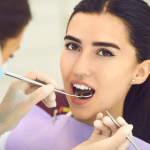Overview
Maintaining excellent oral hygiene is essential for overall health, and a frequently asked question is, “How often should I clean my teeth?” The answer involves both daily home routines and professional dental care. Establishing a consistent cleaning schedule not only prevents cavities, gum disease, and tooth decay but also promotes general wellness. In this blog, we explore the recommended frequency for brushing, flossing, and using supplemental tools to keep your mouth healthy. We also discuss how often to visit a dental professional for check-ups and cleanings, ensuring that any issues are caught early. By understanding these guidelines and integrating them into your daily regimen, you can effectively protect your smile and improve your quality of life. With detailed explanations and practical tips, this guide serves as a roadmap for maintaining optimal oral health through regular cleaning and preventive care. Commit to regular cleaning for a brighter, healthier future every day.
How Often Should You Clean Your Teeth?
When it comes to cleaning your teeth, consistency is the key to success. Most dental professionals recommend brushing your teeth at least twice a day, once in the morning and once before bed, to remove plaque and food particles. Flossing should be performed at least once daily to clear debris from between the teeth where a toothbrush cannot reach. Additionally, using an antimicrobial mouthwash can help reduce bacteria and freshen your breath. It is important to remember that the quality of each cleaning matters just as much as the frequency. Each brushing session should last for about two minutes to effectively cover all surfaces of your teeth. By following these simple guidelines, you create a solid foundation for preventing cavities, gum disease, and bad breath. Establishing a routine that includes these steps will help maintain a healthy, vibrant smile and contribute to your overall well-being every single day without fail.
Maintaining Daily Oral Hygiene at Home
A consistent daily oral hygiene routine is essential for keeping your teeth clean and maintaining overall oral health. At home, the core components of this routine include brushing, flossing, and using mouthwash. Brushing your teeth twice daily with fluoride toothpaste is the foundation of proper dental care. It is advisable to brush in the morning to remove bacteria that accumulate overnight and again before bed to eliminate food particles and plaque formed throughout the day. Each brushing session should last around two minutes, ensuring that every tooth, gum line, and crevice is cleaned effectively. Flossing once a day is equally important because it reaches areas where the toothbrush can miss debris. Using a gentle flossing technique helps prevent gum irritation while removing hidden plaque buildup. In addition to brushing and flossing, incorporating an antimicrobial mouthwash into your routine can further reduce harmful bacteria and enhance freshness. Remember, maintaining a proper oral hygiene schedule at home is not only about following a routine but also about using the correct techniques and tools. Replacing your toothbrush every three months or when its bristles become worn out is vital for effective cleaning. By dedicating just a few minutes each day to these practices, you can prevent dental problems such as cavities and gum disease, ensuring your smile remains healthy and radiant for years to come. By integrating this disciplined routine into your daily life, you safeguard not only your teeth but also contribute to overall physical health and a higher quality of life.
Professional Dental Cleanings and Additional Considerations
Professional dental cleanings are an essential complement to your daily oral hygiene routine. Most dentists advise that you schedule a professional cleaning at least twice a year. These visits allow dental professionals to thoroughly remove tartar that cannot be eliminated by regular brushing and flossing, as well as to detect early signs of dental issues such as cavities and gum disease. During a professional cleaning, your dentist or hygienist will polish your teeth and may offer specialized treatments like fluoride applications to strengthen your enamel. For individuals with a history of dental problems or specific conditions, more frequent visits might be recommended. Professional cleanings also provide an opportunity for personalized advice on how to enhance your at-home routine. They can help identify improper techniques or suggest the use of additional tools that may improve your oral health. By incorporating regular professional cleanings into your schedule, you invest in the longevity of your smile and reduce the risk of more serious dental complications in the future. Remember, professional care is not a substitute for daily cleaning but rather a critical partner in maintaining comprehensive oral health. Regular professional visits not only offer preventative care but also foster a bond with your dentist.
Supplemental Practices for Optimal Oral Health
Beyond the basic routine of brushing and flossing, supplemental practices can greatly enhance your oral health. Using an antimicrobial mouthwash is recommended to help reduce bacteria, freshen breath, and reach areas that brushing may miss. Tongue cleaning is another often-overlooked practice that can remove bacteria and improve overall oral hygiene. Additionally, using interdental brushes or water flossers can further clean between teeth, especially for those with braces or dental implants. It is also advisable to avoid habits that compromise your oral cleanliness, such as frequently snacking on sugary or acidic foods, which can lead to plaque buildup and enamel erosion. Regular hydration with water aids in washing away food particles and diluting acids in the mouth. Adopting these supplemental practices adds an extra layer of protection that supports your daily oral care routine. Moreover, staying informed about new oral care tools and techniques can help you adjust your routine as needed. By integrating these additional measures, you create a comprehensive approach to oral health that not only maintains a clean, radiant smile but also contributes to your overall well-being and confidence. These advanced practices, when combined with a solid daily routine, ensure lasting dental health and a beautiful smile.
Conclusion
In conclusion, cleaning your teeth frequently is vital for a healthy smile. Brush twice daily, floss regularly, and schedule professional cleanings to keep dental issues at bay. Integrate supplemental practices for optimal oral health and make consistent care a lifelong habit for lasting confidence and well-being—every single day matters.





